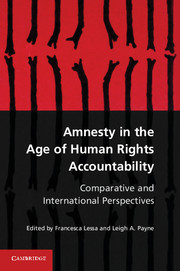2 - The Amnesty Controversy in International Law
Published online by Cambridge University Press: 05 June 2012
Summary
Amnesty provisions offered by states as components of peacemaking or of longer term transitional processes are surely among the most controversial aspects of contemporary transitional justice. The offer of immunity from criminal prosecution to perpetrators of the most heinous of crimes is undeniably at odds with the demand for retribution, an affront to victims and survivors, and potentially a blow to the longer term prospects of establishing and strengthening legal institutions and the rule of law in transitional states. And yet amnesties have also undeniably proven themselves important components of negotiations that have resolved protracted conflicts or restored democracy after periods of authoritarian rule.
Arguments for and against domestic amnesties for serious crimes under international law are many and complex, in keeping with the remarkable number and diversity of amnesty policies and measures that have emerged in transitional contexts around the world over the past several decades. However, since the 1990s at least, an anti-impunity position has taken hold across a wide spectrum of international legal and political bodies such as the United Nations Secretariat and the IACHR, as well as international NGOs and academics. According to this position, as Kathryn Sikkink discusses in her chapter in this volume, individual criminal accountability for serious crimes under international law is a cornerstone of a global human rights community. Domestic amnesties that waive prosecution of individuals for designated acts are thus at odds with the basic values of such a community, and for this reason should be interpreted as contrary to states’ commitments under international law. The position, in other words, entails the project of removing amnesties, especially in relation to international crimes such as genocide, war crimes, and crimes against humanity, from the political and legal tool kits of transitional states.
- Type
- Chapter
- Information
- Amnesty in the Age of Human Rights AccountabilityComparative and International Perspectives, pp. 42 - 66Publisher: Cambridge University PressPrint publication year: 2012
References
- 14
- Cited by



